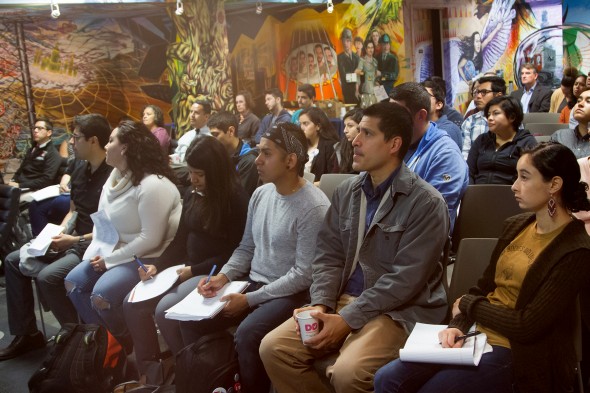Undocumented students’ access to degree completion

The Latino Cultural Center hosted a panel discussion Oct. 11 to consider issues that affect undocumented students’ access to college degrees. — (Photo: Vibhu S. Rangavasan)
Carolina Gallo had dreamed of going to college since she was 10 — two years after she came to the United States. So, even though she’s undocumented and ineligible to receive federal financial aid, she’s committed to crossing the stage — even if that means working three jobs to pay for it.
“It’s been very hard,” said Gallo, who is employed legally thanks to the Deferred Action for Childhood Arrivals (DACA) act, started in 2012 by the Obama administration. The program allows qualifying undocumented youth to obtain work permits and exempts them from deportation for two years, among other benefits.
Since 2001, Illinois legislation has made undocumented Illinois residents eligible for in-state tuition, but for Gallo and students like her, tuition still isn’t affordable. Even with three jobs, the money she makes isn’t enough.
Gallo shared her story at the Latino Cultural Center Oct. 11 to discuss the issues in Illinois affecting undocumented students’ access to degree completion. The panel included Gallo, a student in LAS; Debbie Patiño, a UIC alumnus and community activist; Martin Torres, senior policy analyst and associate director for the Latino Policy Forum; and Roberto Gonzales, professor at the Harvard Graduate School of Education. Tanya Cabrera, associate director for equity and inclusion for the Office of Diversity, moderated the panel.
“It’s a very difficult dance,” said Gonzales, referring to DACA students who work and go to school. Gonzales leads a multi-site longitudinal study about DACA and its beneficiaries called the National UnDACAmented Research Project. “It takes on a heavy emotional and financial toll,” he said.
Gonzales talked about the burden of meeting tuition costs; the program’s positive impacts and limitations; and the blocked, detoured and derailed pathways of DACA recipients and other undocumented students in Illinois.
Torres stepped in to highlight how others can help: by asking local representatives to support the Student ACCESS (Access to College and Career-Education for Statewide Success) bill.
The proposed legislation would make undocumented students who attend four-year public institutions eligible for state-funded scholarships, tuition waivers and financial aid.
“We’re achieving victories along the legislative road,” said Torres, acknowledging the efforts of university leaders and student groups who have lobbied state legislatures in Springfield.
Sixty votes in the House of Representatives are needed before the bill can be approved by the governor to become a law.
Panelists urged others to contact their state representative.
“I think there is a real strong foundation here, and I believe with my heart that we are going to pass this bill,” Torres said.
For more information, email studentaccessil@gmail.com
